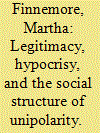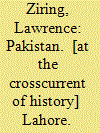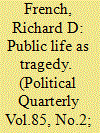|
|
|
Sort Order |
|
|
|
Items / Page
|
|
|
|
|
|
|
| Srl | Item |
| 1 |
ID:
192244


|
|
|
|
|
| Summary/Abstract |
The use of chemical weapons (CW) by Iraq during the Iran-Iraq War appears to have been subject to far less decisive US responses than similar accusations against Syria during the Syrian civil war. However, the two instances have not yet been subject to direct scholarly comparison. This article treats the Iraqi and Syrian instances as two distinct cases and compares US actions to prevent, investigate and deter CW use on each occasion. After demonstrating that the US responded more decisively to the allegations against Syria, we then employ process tracing to locate both cases within existing theoretical discussions of US intervention in the global South generally, as well as CW norm enforcement in particular. In doing so, we propose that, in addition to other factors including the US aspiration to world dominance and its resultant framing of its material and security interests as well as a lesser regard for citizens of the global South, the anti-US stance of either the CW perpetrator or victim can also affect how the US responds to accusations of CW norm violation. This casts further doubt on the veracity of stated humanitarian motives for US intervention abroad.
|
|
|
|
|
|
|
|
|
|
|
|
|
|
|
|
| 2 |
ID:
085927


|
|
|
|
|
| Publication |
2009.
|
| Summary/Abstract |
One would think that unipoles have it made.After all, unipolarity is a condition of minimal constraint.Unipoles should be able to do pretty much what they want in the world since, by definition, no other state has the power to stop them.
|
|
|
|
|
|
|
|
|
|
|
|
|
|
|
|
| 3 |
ID:
051328


|
|
|
|
|
| Publication |
Lahore, Vanguard Books, 2004.
|
| Description |
xvi, 383p.: mapshbk
|
| Standard Number |
9694023882
|
|
|
|
|
|
|
|
|
|
|
|
Copies: C:1/I:0,R:0,Q:0
Circulation
| Accession# | Call# | Current Location | Status | Policy | Location |
| 048256 | 954.91/ZIR 048256 | Main | On Shelf | General | |
|
|
|
|
| 4 |
ID:
076861


|
|
|
|
|
| Publication |
2007.
|
| Summary/Abstract |
The UN has been accused of hypocrisy - failing to act in accordance with the ideals it espouses - in post-Cold War peacekeeping missions. This article argues that such inconsistency can arise from 'organized hypocrisy', a phenomenon identified by organization theorists in which organizations respond to conflicting pressures in external environments through contradictory actions and statements. Organized hypocrisy may have both positive and negative effects on peacekeeping. On the one hand, it may produce or exacerbate gaps between commitments and resources, undermine reforms if they are decoupled from practice, and impede efforts to mitigate harmful peacekeeping externalities. On the other hand, organized hypocrisy may enable the UN, or regional organizations, to manage irreconcilable pressures that might otherwise render the organization incapable of effective action and threaten its survival. This article explains and develops the concept of organized hypocrisy, and apples it to post-Cold War peace operations.
|
|
|
|
|
|
|
|
|
|
|
|
|
|
|
|
| 5 |
ID:
133240


|
|
|
|
|
| Publication |
2014.
|
| Summary/Abstract |
Some of the most perceptive observers of public life have emphasised its tragic dimensions, not so much out of sympathy for politicians, but because the lens of tragedy offers a unique insight into the realities of the world of politics. Here I attempt to synthesise this tragic perspective by employing the comments of those best positioned to identify the salient features of public life, its primary dramatis personae. Politics occasionally provides us with the kind of spectacular catastrophe that journalists like to construe as tragedy. But our purpose is to evoke a different, more personal, less visible kind of tragedy: the small but malignant tragedies of self-betrayal, of inflation of the ego and deflation of conscience, of helpless witness to injustice and misfortune, of status unaccompanied by power or efficacy, of the shrinking of aspiration to the scale of the practicable, of disillusion and, on occasion, of despair.
|
|
|
|
|
|
|
|
|
|
|
|
|
|
|
|
|
|
|
|
|